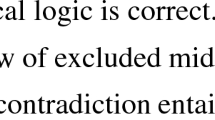Abstract
In natural language we rarely use relation-words with more than three argument places. This paper studies one systematic device, rooted in natural language, by which relations of greater adicity can be expressed. It is based on a higher-order relation between 1-place, 2-place, and 4-place relations (and so on) of which the relation between the positive and comparative degrees of a predicate is a special case. Two formal languages are presented in this connection, one of which represents the language of communication and the other the contextual information against which the first language is interpreted. A semantical theory is described, which treats the two languages in an interdependent way. Logical consequence is non-compact. Connections with issues about vagueness are made.
Similar content being viewed by others
REFERENCES
Aqvist, L.: 1981, ‘Predicate Calculi with Adjectives and Nouns’, Journal of Philosophical Logic 10, 1–26.
Clark, M.: 1984, ‘Degrees of Comparison’, Analysis 44, 178–80.
Cleave, J.: 1987, ‘Logic and Inexactness’, in J. Srzrdnicki (ed.), Stephan Körner – Philosophical Analysis and Reconstruction, Nijhoff, Dordrecht.
Fine, K.: 1975, ‘Vagueness, Truth, and Logic’, Synthese 30, 265–300.
Kaplan, D.: 1989, ‘Demonstratives’, in J. Almog, J. Perry, and H. Wettstein (eds.), Themes from Kaplan., Oxford University Press, New York.
Kamp, H.: 1981, ‘The Paradox of the Heap’, in U. Mönnich (ed.), Aspects of Philosophical Logic, Reidel, Dordrecht.
Klein, E.: 1980, ‘A Semantics for Positive and Comparative Adjectives’, Linguistics and Philosophy 4, 1–45.
Kranz, D. H., R. D. Luce, P. Suppes, and A. Tversky: 1971, Foundations of Measurement, Vol. 1, Academic Press, New York.
Lewis, D.: 1983, ‘Scorekeeping in a Language Game’, in Philosophical Papers, Vol. 1, Oxford University Press, Oxford.
Morton, A.: 1991, Disasters and Dilemmas, Basil Blackwell, Oxford.
Morton, A.: 1994, ‘Two Places Good Four Places Better’, Proceedings of the Aristotelian Society, Suppl. 68, 187–98.
Peacocke, C.: 1981, ‘Are Vague Predicates Incoherent?’, Synthese 46, 121–41.
Rolf, B.: 1980, ‘A Theory of Vagueness’, Journal of Philosophical Logic 9, 315–25.
Stechow, A. von: 1983, ‘Comparing Semantic Theories of Comparison’, Journal of Semantics 3, 1–77.
Vendler, Z.: 1967, ‘The Grammar of Goodness’, in Linguistics in Philosophy, Cornell University Press, Ithaca.
Wheeler, S.: 1972, ‘Attributives and their Modifiers’, Nous 6, 310–34.
Williams, C. J. F. and A. Morton: 1984, ‘“Comparatives” and “Comparatives and Degrees”’, Analysis 44, 15–20.
Wlliamson, T.: 1992, ‘Inexact Knowledge’, Mind 101.
Williamson, T.: 1994, Vagueness, Routledge, London.
Wright, C.: 1992, ‘Is Higher Order Vagueness Coherent?’, Analysis 52, 129–39.
Author information
Authors and Affiliations
Rights and permissions
About this article
Cite this article
Morton, A. HYPERCOMPARATIVES. Synthese 111, 97–114 (1997). https://doi.org/10.1023/A:1004933708851
Published:
Issue Date:
DOI: https://doi.org/10.1023/A:1004933708851




